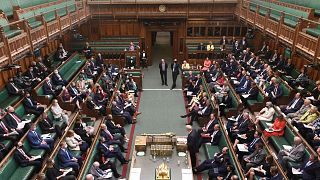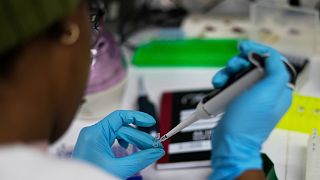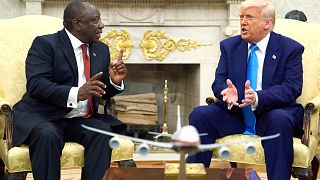South Africa
South Africa's President Cyril Ramaphosa sowed confusion on the side-lines of the visit to South Africa of Finland’s leader.
On Tuesday (Apr. 25), Ramaphosa told reporters that: "The governing party, the ANC, had taken the decision that it was prudent that South Africa should pull out of the ICC."
Hours later, the presidency put forward an error by the ruling ANC, and said Pretoria remained a participant in the Court.
The African powerhouse is due to host a summit of a group of countries including Russia - in August.
However, the Hague-based ICC issued an arrest warrant in March for President Vladimir Putin.
As a member of the ICC, South Africa is theoretically supposed to arrest the Russian leader if he enters its territory.
The presidency said South Africa is considering a legislative amendment that would domesticate and reflect all the articles of the Rome statute, which is the ICC’s founding document.
Accusations of partiality
South Africa had previously sought to withdraw from the ICC in 2016 after a visit by former Sudanese President Omar al-Bashir. Pretoria had refused to arrest the latter, who was also the subject of an arrest warrant from the court.
But Pretoria's withdrawal was thwarted by the country's judiciary, which ruled that such a decision would be unconstitutional.
Many voices on the African continent have by the past criticized the record of the International Criminal Court, accusing the jurisdiction of double standard.
"South Africa remains a signatory to the ICC in line with a resolution of the 55th National Conference of the ANC – held in December 2022 – to rescind an earlier decision to withdraw from the ICC," the presidency stated.
A December resolution was backed on again at a meeting of the National Executive Committee (NEC) of the ANC (21-24 Apr. 2023).
In a statement posted Wednesday (Apr. 26) on Twitter, the ruling African National Congress clarified that:
"The NEC discussions highlighted the need to revitalize the Malabo protocol which would establish a continental criminal court that would complement the ICC as a court of last resort.
The NEC also discussed options to amend national legislation that would domesticate the Rome statute in manner reflects all the articles of the Rome Statute. This includes provision of article 98 of the statute that requires a waiver of immunities for persons charged by the ICC from third-party countries where there is no referral by the United Nations Security Council."
The potential withdrawal from the ICC was presented by the party and South Africa's presidency as "an option that would arise as a measure of last resort in the absence of legal options that would result in fairness and consistency in the administration of international law".
While hosting Namibian's President Hage Geingob on April 20th, President Ramaphosa said South Africa was in discussion with relevant parties as they await BRICS [Editor's Note: group including Brazil, China, India, Russia and South Africa] leaders to confirm their attendance to the summit.
So far, South Africa has chosen to remain neutral regarding the invasion of Ukraine, saying it prefers "dialogue to end the war."
The conflict which has alienated Moscow from Western capitals had - as of 18 April 2023 - made 22,904 civilian casualties including 8534 deaths (Office of the High Commissioner for Human Rights).












Go to video
Semenya ruling shakes foundations of gender rules in sport
Go to video
ICC warns of a dire humanitarian crisis in Sudan as the war rages on
01:53
SMES under pressure as business confidence hits four-year low in South Africa
00:59
South Africa, Austria agree to strengthen ties
Go to video
Former South African deputy president David Mabuza dies at 64